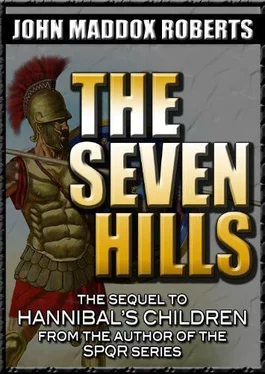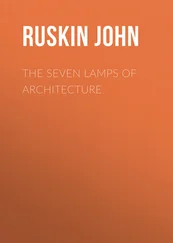John Roberts - The Seven Hills
Здесь есть возможность читать онлайн «John Roberts - The Seven Hills» весь текст электронной книги совершенно бесплатно (целиком полную версию без сокращений). В некоторых случаях можно слушать аудио, скачать через торрент в формате fb2 и присутствует краткое содержание. Жанр: Альтернативная история, на английском языке. Описание произведения, (предисловие) а так же отзывы посетителей доступны на портале библиотеки ЛибКат.
- Название:The Seven Hills
- Автор:
- Жанр:
- Год:неизвестен
- ISBN:нет данных
- Рейтинг книги:5 / 5. Голосов: 1
-
Избранное:Добавить в избранное
- Отзывы:
-
Ваша оценка:
- 100
- 1
- 2
- 3
- 4
- 5
The Seven Hills: краткое содержание, описание и аннотация
Предлагаем к чтению аннотацию, описание, краткое содержание или предисловие (зависит от того, что написал сам автор книги «The Seven Hills»). Если вы не нашли необходимую информацию о книге — напишите в комментариях, мы постараемся отыскать её.
The Seven Hills — читать онлайн бесплатно полную книгу (весь текст) целиком
Ниже представлен текст книги, разбитый по страницам. Система сохранения места последней прочитанной страницы, позволяет с удобством читать онлайн бесплатно книгу «The Seven Hills», без необходимости каждый раз заново искать на чём Вы остановились. Поставьте закладку, и сможете в любой момент перейти на страницу, на которой закончили чтение.
Интервал:
Закладка:
For crucial moments the attack faltered as men fell and others tripped over the fallen. Shaken but confident and valiant, Hamilcar's men reordered themselves and prepared another charge. But the men behind them, still crossing the stream and unaware of what was happening ahead, pressed forward. Hamilcar's army grew very dense. Men were still waiting to step into the stream, the bottom of which was being churned to a deep, clinging mud.
Maddened, the bloodied warriors charged again. But during the lull, slaves and rear-rankers had passed more pila forward. Again, the arms of the first three ranks went back, shot forward and again men tumbled like wheat before the scythe. Slowed, many hurled lighter javelins of their own, but these were easily fended off by the large, heavy Roman shields.
After a shorter pause, the massive army resumed its advance and a third volley of pila fell among them. Now the front lines were barely twenty feet apart, but so many corpses and writhing, wounded men littering the ground slowed the advance to a crawl. Still, their anger and the terrible pressure from behind drove Hamilcar's men on.
Teuta was filled with a terrible apprehension. What sort of fighting was this? The army before them, small as it was, was like some sort of terrible machine. In moments she had seen thousands of men go down before the simple but devastating Roman javelin. And then it happened again and yet again and the mad rush was stalled, and the Romans had hardly lost a man yet. Now she saw the glitter all along the Roman lines as thousands of their short swords, worn so strangely on the right hip instead of the left, were drawn in a singular, upward-and-forward motion. Instantly, distracted though she was, she knew the reason for the strange carry and draw. The man is not hindered by his shield and his draw does not disturb the men to either side. These people think of everything.
And still the men were crossing the stream, churning the ground on the far side to mud, crowding the ranks against one another. The army was losing cohesion and turning into a mob. She looked north and saw that Norbanus's small cavalry force was confining its activities to keeping the much larger Carthaginian force from flanking the Greek contingent.
"Hamilcar," she said, her voice sounding hoarse in her own ears. "Stop your men from crossing the water. They can do no good and the pressure over there will not let up until the Romans begin to retreat."
The shofet just looked annoyed. "They will break very soon. Look, I am already victorious on the south."
She looked that way and indeed the Gauls there were being driven back in confusion by the orderly lines of the Greeks and the Macedonians. Soon they would flank the Romans at that end and roll up the line. This looked encouraging, but a nagging thought assailed her: He knowingly left his south end weak and vulnerable. He did not take the city and port to the south. The road south is wide open. What can this mean?
Then she was appalled to see Hamilcar order his reserve regiments across the stream, into the center. "Shofet! You tire your men to no cause!"
"That will be enough, woman!" he snapped. "They are engaged all along the front now. Soon the weight of my army will crush them underfoot!"
Frustrated, she sat and watched. It occurred to her that Hamilcar had not studied his battles as closely as he thought. His ancestor, Hannibal, had once won a battle something like this: beating a larger army with a smaller. That was Cannae, his greatest victory. She was sure that Norbanus was using some form of the Cannae strategy, but the battles were so dissimilar that she could not understand what he intended.
She did see, plainly, that the Romans were not distressed by the vaunted "weight" of Hamilcar's army. Only the men of the front lines could engage actively. The Romans had a well-drilled maneuver by which, every few minutes, the front-line men stepped back and those behind them stepped forward, keeping fresh, untired men at the fighting line. If the rear men of Hamilcar's army pushed, they merely drove the front-line men into the Roman swords. At intervals, more of the murderous pila would arch out above the heads of the legionaries and plunge into the struggling' mass of Hamilcar's men.
She saw men detach from the rear of the Roman formation, form a neat, orderly rectangle and march to the southern end of the Roman line, there to form a thickened, south-facing line just as Hamilcar's Greeks had their flanking maneuver almost concluded. The Gauls, caught between the two forces, were slaughtered. But the Roman line held. They inflicted few casualties on the orderly Greeks, but the phalanx was stymied.
Teuta stood and paced before the glowering shofet. She saw how long her shadow had grown and turned to look at the sun. She was amazed to see how low it stood in the west. To the north she saw a new movement. The block of Norbanus's Greek-Macedonian phalanx was moving, pushing against the lightly armored Iberians, shoving them back, spearing them, striding over their bodies. Already, men were breaking away from the battle, frustrated at being unable to come to grips with the Romans, unable to take heads and win glory. Slowly, a step at a time, the Greeks were cutting themselves a strong position at Hamilcar's left flank.
"Look!" she said, grasping the shofet by the shoulder and shaking him. "You are being flanked!"
He shook off her hand. "They can accomplish nothing! There are not enough of them."
She knew now that Hamilcar was seeing only the ideal battle in his head, the battle that he wanted to see. Immediately, she determined to extricate her men from this disaster. Hamilcar did not even glance in her direction as she walked to the rear of the platform and leapt upon her horse. Her bodyguard rode behind her as she pelted northward, toward the cavalry action. Beside her rode her standard-bearer. Atop a long pole he bore a golden dragon, its long, waving tail a silken tube that filled with air as he galloped, making the queen conspicuous to her men.
She rode through thousands of wounded men, seeking to put distance between themselves and the battle. She saw that not all were wounded. Idly, she axed a few of these deserters down when they strayed too near. She did not plan to stay on this field, but neither was she deserting. She knew when it was time to withdraw an army to fight another day.
She found her men engaging the Roman cavalry. They were greatly frustrated that the smaller Roman force refused to engage them in a mass and obligingly allow themselves to be slaughtered. Teuta shouted and her trumpeter sounded his horn, and swiftly, the Illyrian horsemen rallied to their queen's banner.
"Come with me!" she yelled to them. "You are needed in the south!" Without question they obeyed, ignoring the dismayed cries and jeers of the other cavalry. They followed their queen, not some foreign king. They cared nothing for his hired lackeys and their fate.
While they assembled, she studied the progress of the battle. The Greeks at this end were now at the stream, able to spear with contemptuous ease the men still trying to cross. When their enemy gave up and ceased trying to cross, the Greeks raised their spears upright, then performed an elegant left-facing maneuver and lowered their spears once again. This time the formation, and its spears, faced south. Then the Greeks began their slow, inexorable push.
They have us, boxed! she thought. There is no way out but south. Now she could see what Norbanus intended. Why he was doing it remained a mystery. With her men behind her, she made a wide half circle around the now-disintegrating army. Whole units were pulling away and retreating to the west, unwilling to cross the stream into what was now nothing more than a slaughter yard. With just a few more men, he could have bagged this whole army, she realized. Yet another doubt assailed her on this day full of doubts. She had a suspicion that the utter destruction of the Carthaginian army and its shofet was the last thing Norbanus wanted. But why?
Читать дальшеИнтервал:
Закладка:
Похожие книги на «The Seven Hills»
Представляем Вашему вниманию похожие книги на «The Seven Hills» списком для выбора. Мы отобрали схожую по названию и смыслу литературу в надежде предоставить читателям больше вариантов отыскать новые, интересные, ещё непрочитанные произведения.
Обсуждение, отзывы о книге «The Seven Hills» и просто собственные мнения читателей. Оставьте ваши комментарии, напишите, что Вы думаете о произведении, его смысле или главных героях. Укажите что конкретно понравилось, а что нет, и почему Вы так считаете.










